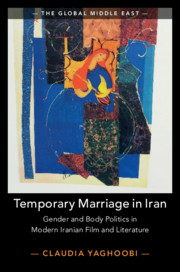Book contents
- Temporary Marriage in Iran
- The Global Middle East
- Temporary Marriage in Iran
- Copyright page
- Dedication
- Contents
- Acknowledgments
- Note on Transliteration, Dates, and Translation
- Prologue
- Part I General Overview
- Part II Representation of Sigheh/Sex Work in the Literature of the Pahlavi Era
- Part III The Islamic Republic and Sigheh in the Film Industry
- 7 Whose Body Matters in Afkhami’s Showkaran
- 8 Politics, Power, and Embodiment in Farahbakhsh’s Zendegi-ye Khosusi
- Epilogue
- Bibliography
- Index
Epilogue
Reclaiming the Female Body via Writing
from Part III - The Islamic Republic and Sigheh in the Film Industry
Published online by Cambridge University Press: 13 January 2020
- Temporary Marriage in Iran
- The Global Middle East
- Temporary Marriage in Iran
- Copyright page
- Dedication
- Contents
- Acknowledgments
- Note on Transliteration, Dates, and Translation
- Prologue
- Part I General Overview
- Part II Representation of Sigheh/Sex Work in the Literature of the Pahlavi Era
- Part III The Islamic Republic and Sigheh in the Film Industry
- 7 Whose Body Matters in Afkhami’s Showkaran
- 8 Politics, Power, and Embodiment in Farahbakhsh’s Zendegi-ye Khosusi
- Epilogue
- Bibliography
- Index
Summary
In the Epilogue, I discuss whether or not the policies of each regime impacted the various authors’ interpretations of sigheh. I posit that the female body and sexuality, in the context of sigheh, has been politicized under both the Pahlavi and Islamic regimes. I also discuss, in response to the fact that men have produced almost all literary and cinematic works about sigheh women in this book, whether male-dominated writing or directing promotes a more realistic characterization of the female protagonists, suggesting instead the importance of women writing themselves and their bodies and discuss the ways that the “body politics” is related to women’s writings. Through their writings, women challenge male-dominated society and culture, literature, and language. Using a new language for the expression of their lived bodily experiences that rejects the phallocentrism of the dominant discourse, women disrupt the dominant male-centered language reclaiming and asserting their sexuality. I examine the flourishing women’s writing in the 1980s (and onward) when women began writing their lived experiences, their bodies, their thoughts, and their lives.
Keywords
- Type
- Chapter
- Information
- Temporary Marriage in IranGender and Body Politics in Modern Iranian Film and Literature, pp. 251 - 265Publisher: Cambridge University PressPrint publication year: 2020

